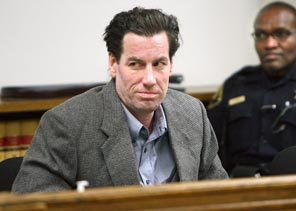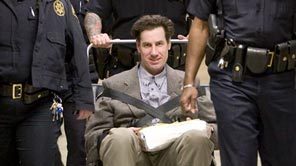Originally published January 23, 2012 at 7:01 PM | Page modified January 23, 2012 at 9:10 PM
Swayed by a psychologist, jury frees 'monster' who attacks again
In October 2003, a King County jury had to decide if repeat rapist Curtis Thompson should be freed from prison or committed to a sex-predator lockup on McNeil Island. Persuaded by the words of forensic psychologist Theodore Donaldson, the jurors set Thompson free. But 10 months later, he attacked four more women, killing one.
Seattle Times staff reporter

"Case that haunts a prosecutor": After his ill-fated release from custody, Curtis Thompson was tried for murder and rape.
DEAN RUTZ / THE SEATTLE TIMES
DOESN'T BLAME JURY: "I don't know what I would have done if I was a juror," says Bernadette McDonald, who was raped by Curtis Thompson after a King County jury declined to send him into the civil-commitment program.
MIKE SIEGEL / THE SEATTLE TIMES
RESTRAINTS: Curtis Thompson was strapped to a chair and overseen by several guards after repeated courtroom outbursts and threats. Over several months of court appearances, the chair was often hooked to an electrical-shock device.
Part One: Expert Costs
State wastes millions on sex-predator legal bills
Sex offenders' legal costs were kept secret from public
Timeline: Evolution of Washington's troubled civil-commitment program
Graphic: How a sex offender gets committed to McNeil Island
Expert costs: source documents
Part Two: Predator Island
Waiting on predator island: Chronic delays drive up cost
Sex offenders could get trials annually, driving up the legal bills
U.S. map: Where sex predators are detained
Predator island: source documents
Part Three: Worst Case
Swayed by a psychologist, jury frees 'monster' who attacks again
Part Four: Challenges
Tiny office says it can save state money on sex-offender defense
![]()
Hours after falling asleep on a hot Seattle August night in 2004, Bernadette McDonald thought she was having a nightmare.
Feeling suffocated, she gasped for air. But a tall, strange man standing over her had already pressed a bleach-soaked sock against her mouth.
McDonald, 29, struggled but the intruder overpowered her. He tied McDonald down and raped her.
Just 10 months earlier in a King County courtroom, a defense expert told jurors that the same man, Curtis Thompson, a repeat rapist facing civil commitment, most likely wouldn't attack another woman. The jury had to decide if Thompson, 44, set to be released from prison, was so dangerous that he needed to be confined to the state's lockup facility on McNeil Island for sex predators.
Persuaded by the words of forensic psychologist Theodore Donaldson, the jurors decided Thompson did not meet the criteria for civil commitment, which would have allowed the state to detain him indefinitely. Instead the jury set him free.
Donaldson would be horrifically wrong with his predictions.
And McDonald wouldn't be the only victim: During his 2004 rampage, Thompson killed a 45-year-old woman and attacked two other women.
The Thompson case is an example of what can go wrong with civil-commitment cases, a process that hinges on the words of dueling forensic psychologists who are paid to sway the jury.
"It's the kind of case that haunts a prosecutor — that I think haunts anybody," said David Hackett, King County prosecutor in charge of civil commitments.
McDonald, speaking publicly for the first time about the 2004 rape, recently told The Times:
"He should have been civilly committed," she said. "I truly think he's evil and a monster."
A good prisoner
Thompson first started shoplifting and car prowling in Seattle at age 10. By his teens, he was carrying weapons, using drugs and sexually abusing family members.
By his 20s, he had committed 40 burglaries. He also began breaking into women's homes at night, threatening them with a gun or knife. He covered their faces with pillows while raping them.
When arrested, Thompson told police he was "afraid that he might kill his next victim," court documents show. He was convicted in 1985 of raping four women and sent to prison.
He served 17 years and was about to be released. In 2002, a psychologist for the state evaluated him and said he was too dangerous to be set free and met the criteria for civil commitment. King County prosecutors filed paperwork and a jury trial was set.
The linchpins of commitment cases are the psychological experts hired by the prosecution and defense to evaluate the offender. They give the jury a glimpse into the sex offender's mind, describe any mental disorders and explain the statistics and tools used to predict his likelihood of committing new sex crimes.
On paper, Thompson was a good prisoner. While detained, he made leather belts and purses and had no serious fights. He also became a member of Jehovah's Witnesses and said his newfound faith would stop him from reoffending.
At Thompson's commitment trial, jurors heard experts give two completely different interpretations of Thompson's mental status and his risk of recidivism.
Forensic psychologist Amy Phenix was hired by King County prosecutors to interview and evaluate Thompson. She determined he was a sexual sadist — someone who got sexually excited by hurting a person. She explained to jurors that Thompson was more likely than not (more than 50 percent) to commit another sexually violent crime, one of the criteria required for civil commitment.
To help her calculate his risk, Phenix turned to the Static 99, a 10-question assessment tool. It grouped Thompson with offenders who had a recidivism rate of about 40 percent, lower than the standard of "more likely than not."
But Phenix said the Static 99 could not take into account several factors that pushed Thompson into a higher danger level: his extreme hostility toward women, his refusal to participate in treatment and his high level of sexual deviancy.
Psychologist Donaldson, who was relatively new to the Washington civil-commitment scene, was hired by Thompson's lawyers. Donaldson worked only for the defense and rarely determined that offenders should be confined beyond prison. He had been fired from a California mental-health department contract to evaluate offenders for civil commitment, a fact jurors learned when Donaldson was on the stand.
Donaldson testified that some of Thompson's actions could be construed as sadistic because he had blindfolded, cut and choked his rape victims. But Donaldson, who had interviewed Thompson for two hours, still didn't consider him to be a sexual sadist and therefore didn't meet criteria required for commitment.
In his psychological evaluation, Donaldson gave credence to Thompson's own words. He believed Thompson when he said he "never got off on hurting" the women and that he never fantasized about it.
"Although there is some mixed evidence regarding Mr. Thompson's ability to control his sexual behavior at this time, in my opinion, there is absolutely no evidence that he currently suffers such a condition," Donaldson stated. "This is based on the observation that Mr. Thompson has not committed a sex offense in well over 17 years."
The reason Thompson hadn't raped a woman in 17 years was because he was in prison.
Donaldson said he wasn't concerned that Thompson refused to attend any sex-offender treatment while incarcerated. "In Mr. Thompson's case, whether he has received treatment or not, it appears quite evident that whatever drove Mr. Thompson to sex offenses in 1985 is, at this point in his life, in remission," he stated.
During the trial jurors saw a calm and clean-cut Thompson, wearing a collared shirt, sweater and khakis. On the stand he explained that he raped women because "I saw no hope in the future, and I wondered why it looked like people in society were happy and had purpose in their lives, and I didn't have any of that at the time."
Thompson testified his perspective on life changed once he became a Jehovah's Witness in prison. He claimed he was now mentally, spiritually and physically healthy.
At the end of the three-week trial, jurors determined Thompson didn't meet criteria for civil commitment. It was the first time a jury had taken such action in Washington since its commitment law passed in 1990. Thompson was released and he moved into his mom's home in North Seattle.
"He was not a nice guy but he didn't have a mental abnormality," Donaldson said recently. "The jury bought it." He said he wouldn't have done anything differently.
Under attack
On Aug. 16, 2004, Bernadette McDonald started her day at work, then went for a run and stopped at the grocery store. Her day ended with dinner and wine with friends on the patio at her Seattle apartment.
She went to bed about midnight.
At 2 a.m. Thompson broke in her kitchen window. Then he tried to suffocate her as he demanded money.
"I kept my wits about me ... and assessed the situation," McDonald said.
She grabbed a lamp on the nightstand and hit him on the head. But he overpowered her and tied her up.
Thompson threatened to kill her if she wasn't quiet.
She remained silent as he drenched her in bleach.
"Are you stuck up?" she recalls him yelling.
After Thompson raped her, McDonald said, he anxiously paced the apartment. He poured bleach on the sheets and stripped the bed. Then he threw the bedding in the apartment complex's washing machine. That terrified her.
"I knew he was trying to destroy evidence," she said.
McDonald said he kept asking her, "What am I going to do with you?"
She begged him not to kill her and recalls him laughing at times during the two-hour attack.
In an attempt to get him to leave, she told Thompson her car was parked nearby. McDonald said he became flustered, grabbed her car keys and drove off. She went to neighbors for help.
About one week later, Thompson broke into a studio apartment in the Bryant neighborhood, just blocks from where he lived. Deborah Byars, a mother of two grown children, was inside. Thompson choked the 45-year-old with a telephone cord as she fought back.
He repeatedly stabbed her in the neck and chest with a flat-head screwdriver, according to court documents.
That same day, Thompson trapped two women in an apartment building elevator in a nearby neighborhood. He attacked them and forced one to take off her shirt. Another woman saw the attack and called 911. When police arrived, Thompson assaulted two officers before they were able to handcuff him.
Byars' body wasn't discovered for three days.
Freedom cut short
The Curtis Thompson case continues to haunt the King County prosecutor's office. Fearing a repeat of that tragedy, it took action against a sex offender who was released in 2010 after a jury here found he didn't meet criteria for civil commitment.
James Brigham, 45, had served time for first-degree rape and admitted to trying to rape six other women.
Within days of his release, Brigham broke several conditions of his community supervision, and admitted to viewing and masturbating to porn on his cellphone. He was arrested at the Kent library where he had used a public computer to view sexually suggestive websites.
Concerned that Brigham's inappropriate behavior would lead to him finding new victims, King County prosecutors filed another petition for commitment against him.
"He used his claim of being reformed to avoid commitment," Hackett explained. "Later he's doing ... the very behaviors he told the jury would result in him finding a new victim."
Last month, weeks before his trial was to start, Brigham agreed to be committed.
Five life sentences
The Thompson case still angers families and reminds others just how fortunate they are to be alive.
Looking back, Phenix, the prosecution expert, said she tried to convey how dangerous Thompson was to the community.
"This information is very difficult for jurors to fully grasp and understand," she said. "People tend to want to think other people are good or changed — that's human nature."
Richard Warner, one of Thompson's lawyers, said jurors understood the unreliability of risk-assessment tools and the difficulty in proving he was a threat.
"The system worked," he said. "The state didn't meet its burden."
But Warner also said he never thought Thompson would sexually reoffend, and has empathy for the victims.
Thompson is now serving five life sentences for the murder, rape and burglaries.
Nanci Newhall, Byars' sister, is outraged at Donaldson and the jury for setting Thompson free. "I was beside myself," she said. "Why did they let him out?"
For those opposed to civil commitment, Newhall has a strong message:
"Walk a mile in my shoes and the other people that have gone through this, see if they still feel the same. I'm all for fairness and civil liberties ... but that doesn't mean you let a psychopath out."
McDonald doesn't blame the jurors. "I don't know what I would have done if I was a juror and presented with the same information," she said.
McDonald decided to share her story to embolden other victims to have a voice. She was determined that the rape wouldn't destroy her. With the support of family and friends and counseling, she feels healed and rarely thinks about that night.
"I'm not bitter," she said. "I'm thankful I'm alive and survived it."
Christine Willmsen: 206-464-3261 or cwillmsen@seattletimes.com. On Twitter @Christinesea. Researcher Gene Balk contributed to this report.
















